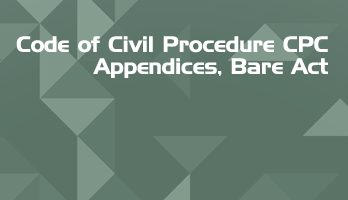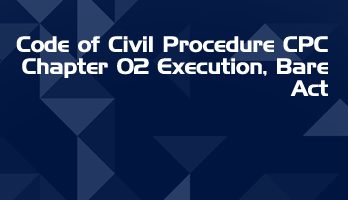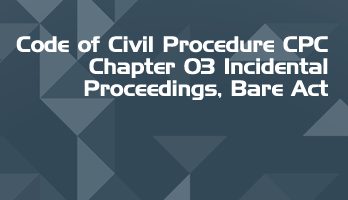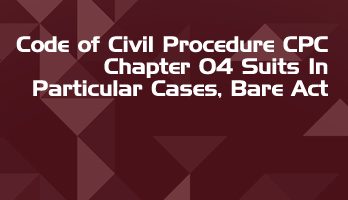A 'Bare act' is the actual legislation passed by the Parliament of India. Generally, an act sets out the high level legal and policy principles applicable to the subject matter of the law.
Most acts are accompanied by 'subsidiary legislation' such as rules, regulations, notifications and orders; which address the actual implementation detail of the act.
Free Full Course Available on LawMint's YouTube Channel
How to Land Your Dream LLB Internship in a Top Law Firm
- Part 1 - Introduction
- Part 2 - Internship Planning
- Part 3 - Internship Research
- Part 4 - Building Your Profile
- Part 5 - The Email
- Part 6 - The Resume
- Part 7 - The Cover Letter
- Part 8 - The Interview
- Part 9 - Self Development
Practical and comprehensive course, with real examples and step-by-step analysis of the complete internship application process. Check out LawMint's YouTube channel now!
Civil Procedure Code, 1908
Part VIII – Reference, Review and Revision
Section 113 – Reference to High Court
Subject to such conditions and limitations as may be prescribed, any Court may state a case and refer the same for the opinion of the High Court, and the High Court may make such order thereon as it thinks fit;
Provided that where the Court is satisfied that a case pending before it involves a question as to the validity of any Act, Ordinance or Regulation or of any provision contained in an Act, Ordinance or Regulation, the determination of which is necessary for the disposal of the case, and is of opinion that such Act, Ordinance, Regulation or provision is invalid or inoperative, but has not been so declared by the High Court to which that Court is subordinate or by the Supreme Court, the Court shall state a case setting out its opinion and the reasons therefor, and refer the same for the opinion of the High Court.
Explanation – In this section “Regulation” means any Regulation of the Bengal, Bombay or Madras Code or Regulation as defined in the General Clauses Act, 1897, (10 of 1897) or in the General Clauses Act of a State.
STATE AMENDMENTS
Andhra Pradesh – In the explanation to section 113 after the words “any Regulation of the Bengal, Bombay or Madras Code” insert the words “or any Regulation of the Madras Code in force, in the State of Andhra as it existed immediately before the 1st Nov. 1956”.
Tamil Nadu – In the explanation to section 113 after the words “any Regulation of the Bengal, Bombay or Madras Code” insert the words “or any Regulation of the Madras Code in force in the territories specified in Second Schedule to the Andhra Pradesh and Madras”
Union Territory of Pondicherry – Same as in Tamil Nadu.
Section 114 – Review
Subject as aforesaid, any person considering himself aggrieved –
- by a decree or order from which an appeal is allowed by this Code, but from which no appeal has been preferred,
- by a decree or order from which no appeal is allowed by this Court, or
- by a decision on a reference from a Court of Small Causes, may apply for a review of judgment to the Court which passed the decree or made the order, and the Court may make such order thereon as it thinks fit.
Section 115 – Revision
- The High Court may call for the record of an case which has been decided by any Court subordinate to such High Court and in which no appeal lies thereto, and if such subordinate Court appears –
- to have exercised a jurisdiction not vested in it by law, or
- to have failed to exercise a jurisdiction so vested, or
- to have acted in the exercise of its jurisdiction illegally or with material irregularity, the High Court may make such order in the case as it thinks fit; Provided that the High Court shall no, under this section, vary or reverse any order made, or any order deciding an issue, in the course of a suit or other proceeding, except where –
- the order, if it had been made in favour of the party applying for revision, would have finally disposed of the suit or other proceedings, or
- the order, if allowed to stand, would occasion a failure of justice or cause irreparable injury to the party against whom it was made.
- The High Court shall not, under this section, vary or reverse any decree or order against which an appeal lies either to the High Court or to any Court subordinate thereto.
Explanation – In this section, the expression “any case which has been decided” includes any order made, or any order deciding an issue in the course of a suit or other proceeding.
STATE AMENDMENTS
Madhya Pradesh – For Section 115 of the principal Act, the following Section substituted. “115. Revision – The High Court may call for the record of any cases which has been decided by any Court subordinate to such High Court and in which no appeal lies thereto, and if such subordinate Court appears – (a) to have exercised a jurisdiction not vested in it by law; or (b) to have failed to exercise a jurisdiction so vested; or (c) to have acted in the exercise of its jurisdiction illegally or with material irregularity, the High Court may make such order in the case as it thinks fit; Provided that the High Court shall not, under this section, vary or reverse any order made or any order deciding an issue, in the course of a suit or other proceedings except where – (a) the order, if it had been made in favour of the party applying for the revision, would have finally disposed of the suit or proceeding; or (b) the order, if allowed to stand, would occasion a failure of justice or cause irreparable injury to the party against whom it was made. (2) The High Court shall not, under this section, vary or reverse any decree or order against which an appeal lies either to the High Court or to any court subordinate thereto. Explanation – In this section, the expression any case which has been decided includes any order made, or any order deciding an issue in the course of a suit or other proceeding.
Orissa – In its application to the State of Orissa, for section 115, substitute the following – “115. Revision – The High Court, in cases arising out of original suits or other proceedings of the value exceeding one lakh rupees, and the District Court, in any other case, including a case arising out of an original suit or other proceedings instituted before the commencement of the Code of Civil Procedure (Orissa Amendment) Act, 1991, may call for the record of any case which has been decided by any Court subordinate to the High Court or the District Court, as the case may be, and in which no appeal lies thereto, and if such subordinate Court appears – (a) to have exercised a jurisdiction not vested in it by law; or (b) to have failed to exercise a jurisdiction so vested; or (c) to have acted in the exercise of its jurisdiction illegally or with material irregularity, the High Court or the District Court, as the case may be, may make such order in the case as it thinks fit; Provided that in respect of cases arising out of original suits or other proceedings of any valuation decided by the District Court, the High Court alone shall be competent to make an order under this section; Provided further that the High Court or the District Court shall not, under this section, vary or reverse any order, including an order deciding an issue, made in the course of a suit or other proceedings, except where – (i) the order, if so varied or reversed, would finally dispose of the suit or other proceedings; or (ii) the order, if allowed to stand, would occasion a failure of justice or cause irreparable injury to the party against whom it was made. Explanation – In this section, the expression any case which has been decided includes any order deciding an issue in the course of a suit or other proceeding.”
Uttar Pradesh – In its application to the State of Uttar Pradesh, for section 115, substitute the following – “115 Revision – The High Court, in cases arising out of original suits or other proceedings of the value exceeding one lakh rupees or such higher amount not exceeding five lakh rupees as the High Court may from time to time fix, by notification published in the Official Gazette including such suits or other proceedings instituted before the date of commencement of the U.P. Civil Laws (Amendment) Act, 1991, or as the case may be, the date of commencement of such notification and the District Court in any other case, including a case arising out of an original suit or other proceedings instituted before such date, may call for the record of any case which has been decided by any Court subordinate to such High Court or District Court, as the case may be, and in which no appeal lies thereto, and if such subordinate Court appears – (a) to have exercised a jurisdiction not vested in it by law; or (b) to have failed to exercise a jurisdiction so vested; or (c) to have acted in the exercise of its jurisdiction illegally or with material irregularity, the High Court or the District Court, as the case may be, may make such order in the case as it thinks fit; Provided that in respect of cases arising out of original suits or other proceedings of any valuation, decided by the District Court, the High Court alone shall be competent to make an order under this section; Provided further that the High Court or the District Court shall not, under this section, vary or reverse any order including an order deciding an issue, made in the course of a suit or other proceeding, except where – (i) the order, if so varied or reversed, would finally dispose of the suit or other proceeding; or (ii) the order, if allowed to stand, would occasion a failure of justice or cause irreparable injury to the party against whom it was made; Provided also that where a proceeding of the nature in which the District Court may call for the record and pass orders under this Section was pending immediately before the relevant date of commencement referred to above, in the High Court, such Court shall proceed to dispose of the same. Explanation – In this section, the expression “any case which has been decided” includes any order deciding an issue in the course of a suit or other proceeding.”
West Bengal – After Section 115 of the Code the following section 115A inserted: “115A. District Court’s powers of revision – (1) A District Court may exercise all or any of the power which may be exercised by the High Court under section 115. (2) Where any proceedings by way of revision is commenced before a District Court in pursuance of the provision of sub – section (1), the provisions of section 115 shall, so for as may be, apply to such proceeding and references to the said section 60 the High Court shall be construed as reference to the District Court. (3) Where any proceeding for revision is commenced before the District Court, the decision of the District Court on such proceeding shall be final and no further proceeding by way of revision shall be entertained by the High Court or any other Court. (4) If any application for revision has been made by any party either to the High Court under section 115 or to the District Court under this section, no further application by the same party shall be entertained by the other of them. (5) A Court of an Additional Judge shall have and may exercise all the powers of a District Court under this section in respect of any proceeding which may be transferred to it by or under any general or special order of the District Court”
Important Central Acts in Regional Languages
Legislative department website also features regional language versions of several important Central Acts.
Free Full Course Available on LawMint's YouTube Channel
How to Land Your Dream LLB Internship in a Top Law Firm
- Part 1 - Introduction
- Part 2 - Internship Planning
- Part 3 - Internship Research
- Part 4 - Building Your Profile
- Part 5 - The Email
- Part 6 - The Resume
- Part 7 - The Cover Letter
- Part 8 - The Interview
- Part 9 - Self Development
Practical and comprehensive course, with real examples and step-by-step analysis of the complete internship application process. Check out LawMint's YouTube channel now!












